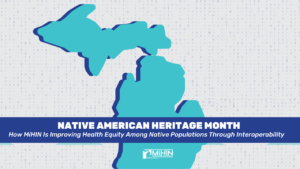
Health disparities among Native Americans are vast and persistent. Interoperability can help close that gap.
Michigan is home to 12 federally recognized tribes–with approximately 200,000 tribal members in total. Data show that Native American communities face inequity in health care and health status compared to other U.S. populations, including disproportionately higher rates of disease and shorter life expectancy.
The issue doesn’t end there – there are overarching challenges that further exacerbate the lack of access to care for American Indians, including the inability to accurately and seamlessly share digital health information, incomplete and fragmented data, and care processes that are siloed and not shared across boundaries. The bottom line: we must generate improved, more equitable health outcomes for Native populations in the state.
To account for the health disparity data gap, the Michigan Health Information Network (MiHIN), began working with the tribes in Michigan to establish culturally relevant, interoperable, health information exchange opportunities.
Under the leadership of Krystal Schramm, “Miskwa Mishiki Que – Red Turtle Woman,” descendant of Little River Band of Ottawa Indians Tribe, Senior Technical Business Analyst, the MiHIN team met one-on-one with tribes across the state to learn about each tribe’s respective patient populations, cultural needs, tribal clinics and clinical workflows and have been working with tribes to initiate utilization of the health information exchange dataflows to receive data for tribal patients from both tribal and non-tribal facilities.
Additionally, the MiHIN team has been collaborating closely with tribal clinic administrators and key tribal stakeholders to bridge the gap between tribal and non-trial entities in the State of Michigan, including the Michigan Department of Health and Human Services, the Inter-Tribal Council of Michigan, MPHI, Indian Health Service, tribal government officials, the Michigan Tribal Health Directors’ Board, and the Healthcare Information and Management Systems Society Michigan Chapter (HIMSS).
As a member of the Native community herself, Schramm was acutely aware that tribal populations have historically been underrepresented in public health data — and the resulting lack of support available when making decisions regarding tribal healthcare, both at the individual patient level and at clinic and system-wide levels.
Due to the fact that each of the 12 federally recognized tribes in Michigan are sovereign nations, the tribal healthcare system is inundated with piecemeal, disconnected and inconsistent data that leads to poor quality care, delays and no usable personal health record. By enabling the flow of data through the MiHIN network, health information can be shared quickly and seamlessly between systems, therefore establishing order and structure in the digital health ecosystem.
To date, eight of the 12 tribes and the Urban Indian Health Center have signed the necessary legal and technical agreements to join the statewide network of health information exchanging entities. By enabling the flow of data through the MiHIN network, health information can be shared quickly and seamlessly between systems, thereby increasing efficiency, improving patient care and safety and, ultimately, improving health equity amongst Native populations.
By nearly any measure, health care for Native Americans lags behind other U.S. populations. Facilitating a seamless interoperability between systems will provide patients and health professionals alike with real-time access to quality data. Increasing tribal representation in healthcare data will ultimately lead to improved health equity, outcomes, and patient satisfaction for tribal patients. More inclusive data equals better health equity.
To learn more about MiHIN or its work with Michigan’s Native American tribes, visit our website or contact Krystal Schramm at krystal.schramm@mihin.org.
